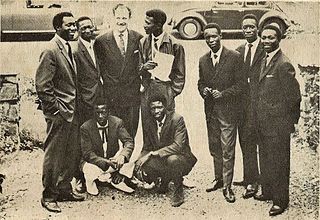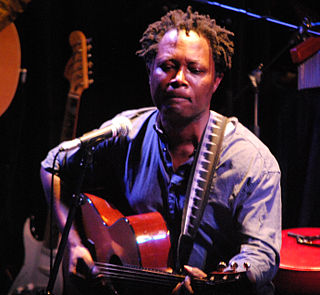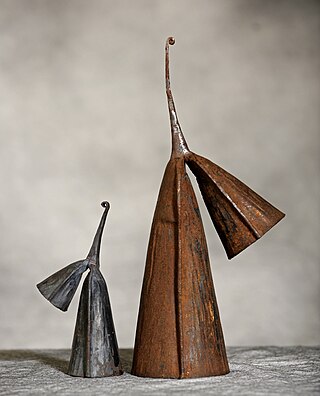Biography
Kachamba was born on 18 October 1953 in Blantyre, Malawi and died 12 January 2001 in Chileka. He was born in a musical family and he contributed enormously to the development of the Kwela music.
Beginning in 1972 Kachamba toured extensively covering 33 countries in Africa, Europe and the Americas. In May 1988 he toured Finland on the invitation of the Institute for Workers Music, Helsinki, in May 1989 he performed at the Ethnographic Museum of the University of Zürich. In 1991 his band toured Belgium and Germany. In September 1994 Donald Kachamba was invited to the colloquium "Music and Anthropology" in Lisbon to present one of his films. Thereafter he gave lecture performances in Berlin, Frankfurt and Salzburg. The most recent European tour was in January 1995 to the Netherlands, Belgium and France (on the invitation by Radio France).
Kachamba was artist-in-residence at UCLA's Department of Ethnomusicology from November 1999 until July 2000.
Donald Kachamba died on Friday 12 January 2001.

The washtub bass, or gutbucket, is a stringed instrument used in American folk music that uses a metal washtub as a resonator. Although it is possible for a washtub bass to have four or more strings and tuning pegs, traditional washtub basses have a single string whose pitch is adjusted by pushing or pulling on a staff or stick to change the tension.

The xylophone is a musical instrument in the percussion family that consists of wooden bars struck by mallets. Like the glockenspiel, the xylophone essentially consists of a set of tuned wooden keys arranged in the fashion of the keyboard of a piano. Each bar is an idiophone tuned to a pitch of a musical scale, whether pentatonic or heptatonic in the case of many African and Asian instruments, diatonic in many western children's instruments, or chromatic for orchestral use.
The native folk music of Mozambique has been highly influenced by Portuguese colonisation and local language forms. The most popular style of modern dance music is marrabenta. Mozambican music also influenced another Lusophone music in Brazil, like maxixe, and mozambique style in Cuba and New York City.

Jean-Bosco Mwenda, also known as Mwenda wa Bayeke, was a pioneer of Congolese fingerstyle acoustic guitar music. He was also popular in other African countries, particularly in East Africa, and in the late 1950s and early 1960s was briefly based in Nairobi, Kenya, where he had a regular radio show and became a profound influence on a generation of Kenyan guitarists.
The music of Malawi has historically been influenced by its triple cultural heritage of British, African, and American music. Malawians, known for their history as travelers and migrant workers, have contributed to the spread of their music across the African continent, blending it with various musical forms. A significant factor in this musical amalgamation was World War II, during which soldiers transported music to distant lands and brought it back, leading to the popularity of guitar and banjo duos as dance bands by the war's end. Both instruments were imported. Additionally, Malawians working in mines in South Africa and Mozambique influenced the fusion of music styles, giving rise to genres such as Kwela.
Mbaqanga is a style of South African music with rural Zulu roots that continues to influence musicians worldwide today. The style originated in the early 1960s, and blends traditional African vocal styles and melodies with European and American popular music.

Soukous is a genre of dance music originating from the Democratic Republic of the Congo and the Republic of the Congo. It derived from Congolese rumba in the 1960s, with faster dance rhythms and bright, intricate guitar improvisation, and gained popularity in the 1980s in France. Although often used by journalists as a synonym for Congolese rumba, both the music and dance associated with soukous differ from more traditional rumba, especially in its higher tempo, song structures and longer dance sequences.
Kwela is a pennywhistle-based street music from southern Africa with jazzy underpinnings and a distinctive, skiffle-like beat. It evolved from the marabi sound and brought South African music to international prominence in the 1950s.

Le Grand Kallé et l'African Jazz, often simply referred to as African Jazz, was a popular and extremely influential Congolese rumba (soukous) band from the modern-day Democratic Republic of the Congo. Founded in 1953 in Léopoldville under Belgian colonial rule, the band was led by Joseph Kabasele Tshamala, popularly known by his stage name Le Grand Kallé. The group saw its heyday between 1958 and 1962, after which it was hit by defections by its members in 1963. It was briefly revived after 1966.

Jean-Luc Ponty is a French jazz and jazz fusion violinist and composer.

Ramón "Mongo" Santamaría Rodríguez was a Cuban percussionist and bandleader who spent most of his career in the United States. Primarily a conga drummer, Santamaría was a leading figure in the pachanga and boogaloo dance crazes of the 1960s. His biggest hit was his rendition of Herbie Hancock's "Watermelon Man", which was inducted into the Grammy Hall of Fame in 1998. From the 1970s, he recorded mainly salsa and Latin jazz, before retiring in the late 1990s.

Philip Catherine is a Belgian jazz guitarist.
Sam Mangwana, is a Congolese-born musician, born to an Angolan mother and Zimbabwean father. He was the frontman of his bands Festival des Maquisards and African All Stars. Mangwana was a member of François Luambo Makiadi's seminal band TPOK Jazz, and Tabu Ley Rochereau's bands African Fiesta, African Fiesta National and Afrisa International.

Pascal Lokua Kanza, known professionally as Lokua Kanza, is a Congolese singer, songwriter, arranger, producer, and multi-instrumentalist. He is known for his soulful, folksy sound, which is atypical of the dancefloor-friendly African rumba music that is common in the Democratic Republic of the Congo. His proficiency in blending different musical styles and cultural influences has made him a celebrated artist, admired for his distinctive and evocative musical creations. He sings in French, Swahili, Lingala, Portuguese, English, and Wolof. He was a coach in The Voice Afrique Francophone in 2016 and 2017.
Gerhard Kubik is an Austrian music ethnologist from Vienna. He studied ethnology, musicology and African languages at the University of Vienna. He published his doctoral dissertation in 1971 and achieved habilitation in 1980.
Muziki wa dansi, or simply dansi, is a Tanzanian music genre, derivative of Congolese soukous and Congolese rumba. It is sometimes called Swahili jazz because most dansi lyrics are in Swahili, and "jazz" is an umbrella term used in Central and Eastern Africa to refer to soukous, highlife, and other dance music and big band genres. Muziki wa dansi can also be referred to as Tanzanian rumba, as "african rumba" is another name for soukous.

A bell pattern is a rhythmic pattern of striking a hand-held bell or other instrument of the idiophone family, to make it emit a sound at desired intervals. It is often a key pattern, in most cases it is a metal bell, such as an agogô, gankoqui, or cowbell, or a hollowed piece of wood, or wooden claves. In band music, bell patterns are also played on the metal shell of the timbales, and drum kit cymbals.

The Afrika-Haus Freiberg is a museum of modern African art at Freiberg am Neckar in Germany.
Kélétigui Diabaté was a Malian musician, described as an "undisputed master" of the balafon, and as "one of the greatest figures in Malian contemporary music".
The Oral Literature Research Programme is an independent research institution founded in 1989 by renowned Malawian cultural anthropologist Moya Aliya Malamusi, and his sister, the late Lidiya Malamusi. It is based in Chileka, Blantyre, Malawi, about a kilometre from the Chileka International Airport. Moya Aliya Malamusi is an ethnomusicologist and lecturer at the University of Vienna and Sigmund Freud University. Malamusi has done extensive research into guitar styles and techniques in southern Africa. He has also published a selection of his field recordings on CDs From Lake Malawi to the Zambezi and the DVD/CD Endangered traditions—Endangered Creativity.










